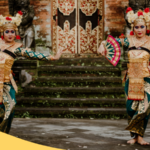Fantastic country and rich culture. Who wouldn’t fall in love in this land of K-pop idols? So, here is some essential Korean vocabulary about places (곳 got). Let’s start learning!
Seoul, South Korea, is one of the top places to visit. It’s the land of the huge K-pop idols and celebrities, skincare and makeup products, and course, delicious Korean food. Every Korean culture fan’s dream is to visit Korea at least once in their lifetime. Even if you’re not a fan of anything that came from Hallyu, you’ll still want to visit South Korea for different kinds of career opportunities.
But, traveling around South Korea requires people more than just a plane ticket, passport, and money. You should also back yourself up with basic words and phrases. Yes, there are lots of jaw-dropping and essential places in South Korea to visit, but how can you enjoy it if you don’t know how to speak Korean words?
So, today, we will learn Korean vocabulary about the place. Learning the Korean language will help you while going around and finding a certain location. You can use it in shopping, doing business transactions, eating, and just having conversations with the locals. If you’re new to Korea in learning Korean, do not worry because words are translated into English. You can also begin your lesson with Ling App to learn Korean more.
Historical Places In The Korean Culture
South Korea is blessed with lots of fantastic places to visit. Starting from the tourist attractions, historical places, and even K-drama shooting spots. If you haven’t visited the country, you’ll know many great places because of the Korean dramas. When you’re watching K-dramas, you’re having a glimpse of what South Korea looked like even during ancient times. Here are some historical places in South Korea:
1. Gyeongbokgung Palace (Seoul)

This is the main and largest palace among the five palaces in South Korea. You might have seen this multiple times in different Korean dramas with ancient Korean settings. This is called “The jewel of Korean history. It was built under King Taeho’s order in 1935 during the Joseon Dynasty. Fun fact, this is also the place where King Sejong created the Korean alphabet known as Hangul.
Gyeongbokgung Palace is also the filming spot of different K-dramas like “Moon Embracing the Sun,” “Rooftop Prince,” and Queen In-Hyun’s Man. When you visit this place, prepare for a spectacular view of the inner-city mountains, which makes a beautiful view between the palace and nature.
2. Changdeokgung Palace Complex (Seoul)

Changdeokgung Palace Complex is the second most popular palace in South Korea that was built in 1405. This palace is called “The Palace of Illustrious Virtue” and was considered the secondary home of Kings and Queens. This palace is known for its secret garden with a large pond Buyongji found in the middle.
What makes this pond so special is the cross-shaped roof supported by pillars from the pond. Not only that this palace is seen in K-dramas like “Kingdom” and “Jewel in the Palace,” but it is also on the UNESCO World Heritage List.
3. Jongmyo Shrine (Seoul)

Experience the solemn and mysterious atmosphere as you enter the Jongmyo Shrine. This palace was built in 1395. It is called “Protector of the King Spirits” because it preserves the spirit of the Joseon Kings and Queens. Jongmyo Shrine is very important in Korean history because, during the Joseon period, kings go here to attend the royal procession in honor of their ancestors.
4. Bukchon Hanok Village (Seoul)

Bukchon Hanok Village, also known as the “Northern Village,” is a traditional Korean village that gathers around 800 to 900 Hanok. Bukchon Hanok Village is a residential area of nobles, influential people, and high-ranking government officials. This will give you the vibe of how Koreans lived 600 years ago.
If you visit this village, make sure to be quiet at all times and just enjoy the traditional Korean culture vibe. You can also visit tea houses, cafes, restaurants, and galleries.
Common Korean Vocabulary About Place
Traveling to a foreign country without knowing anything about naming different places is very challenging. What if you got lost? What is if you can’t find your way? This is why learning about basic Korean vocabulary about the place can really help you in your journey in South Korea.

Let’s start this by learning the Korean translation of the word “place” in Korean. The Korean word used for the word “place” is 곳 (got). When talking about a place, we can’t help to associate it with learning the word “Where”( –어디 eodi). These two words are essential in learning Korean vocabulary about places, especially if you love traveling to South Korea.
Now that you’re all prep, here’s a list of common Korean vocabulary about places that you should learn.
공항 (Gonghang)
English Translation: Airport

The airport 공(항 Gonghang) is definitely one of the first places you’ll visit when you visit South Korea. There are different airports in South Korea like Gimpo Airport Station (김포공항역gimpogonghangyeok) and Incheon International Airport Station (인천국제공항역incheongukjegonghangyeok). Most of the staff speak English, but it wouldn’t hurt to learn some basic airport vocabulary to make your experience smoother and easier.
역 (Yeok)
English Translation: Station

The next Korean vocabulary about places you should learn is a station (역 Yeok). In South Korea, subways, trains, and buses are the main transportation used. As a traveler, you must take time to know where these stations are found or at least book accommodation near stations to make traveling a lot easier.
You can also learn other vocabularies related to station such as bus station (버스 정류장 beoseu jeongnyujang), train station (기차역 gichayeok), and subway station (지하철역 jihacheoryeok).
식 당 (Sikdang)
English Translation: Restaurant

A travel experience to South Korea will not be completed without tasting authentic Korean food. This is why a restaurant (식 당 Sikdang) is a must-learn Korean vocabulary about the place. We all know that it’s one of the famous cuisines worldwide, but of course, it’s different when you eat in a restaurant in South Korea.
가게 (Ga-gye)
English Translation: Store/Shop
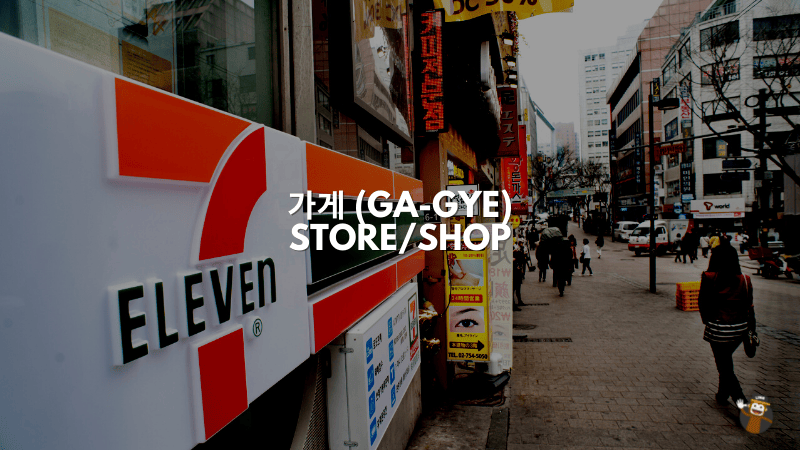
There’s one kind of store that you’ll mostly see in the streets of South Korea – convenience store (편의점 (pyeon-ui-jeom). When you visit Korea, you can buy almost everything that you need in a convenience store. These stores are usually open for 24 hours, so if you have to buy something so sudden, let’s say a snack or drink, this is where you can go. If you have time and you want to do a grocery, you can visit any grocery store (식품점 sikpumjeom) near your place.
There are also stores where you can go shopping like department stores (백화점 baekhwajeom). Other stores that people usually visit are souvenir store 기념품 가게 (ginyeonpum ga-gye), clothing store 가게 (eot gagye), furniture store (가구점 gagujeom), cake shop 케이크 가게 (keikeu ga-gye), and flower shop (꽃집 ggotjib) which literally means “flower house.”
커피샾 (Keopisyap)
English Translation: Coffee Shop

Coffee shops (커피샾 Keopisyap) are one of the most visited places around the world; this is why it is an important Korean vocabulary about the place. Aside from buying coffee, this place also serves as a meeting place for dates, business, and more.
If you watch a handful of Korean dramas, you’ll notice that most of them (except historical K-dramas) have a scene filmed in one of the famous coffee shops in South Korea. Just think about “Hometown Cha-cha-cha, Goblin”, “Record of Youth,” “What’s Wrong WIth Secretary Kim?”. These are just a few of the K-dramas which have scenes in a coffee shop.
은행 (Eun-haeng)
English Translation: Bank

Money is another travel essential that’s why we should really include bank (은행 Eun-haeng) in the list of common vocabulary about places. Knowing where the banks are located is important because you can go there when you want to exchange your foreign currency for Korean currency, report card issues, or open an account. Some of the leading banks in South Korea are Nonghyup Bank, Hana Financial Group, and Korea Development Bank.
병원 (Beongwon)
English Translation: Hospital

What if you got sick or had an emergency? It’s essential to know where the hospital is. Some of the top Korean hospitals are Asan Medical Center2, Samsung Medical Center2, and Seoul National University Hospital. Fun fact, the K-drama “Hospital Playlist” was filmed in the Ehwa Womans University Seoul Hospital, which is located in Gangseo-gu, Seoul. So, if you’re a fan, here’s a hospital that you can pay a visit to just for the experience.
약국 (Yakkuk)
English Translation: Pharmacy

After learning the Korean word for hospital, of course, we should also learn the Korean word for pharmacy. You should know where to buy medicines, especially if you have allergies and maintenance. Since the world is mostly digital, online pharmacies are also available in South Korea, which is a big advantage during this time of the COVID-19 pandemic.
학교 (Hakgyo)
English Translation: School

Even if you don’t have any plans of studying in South Korea, I’m sure you might have heard about some schools and universities because of K-dramas. Some of these schools are Keimyung University (featured in Boys Over Flowers), Ewha Woman’s University (featured in Love Alarm), and Konkuk University (featured in Goblin).
If you are planning to study in South Korea, make sure to read all about the Korean educational system and do research about different schools and universities that might suit you. Remember that studying in a foreign land is really challenging, so you better do a comprehensive research before diving into it.
교회 (Gyohoe)
English Translation: Church

Keeping your faith strong while in South Korea is really important; that’s why it’s important to include the word “church” in our list of common Korean vocabulary about places. In South Korea, the major religions in the world, such as Christianity, Buddhism, Islam, and Confucianism, co-exist with Shamanism. Because of this diversity, you should always be respectful to everyone, no matter what their religion or race is.
도서관 (Doseogwan)
English Translation: Library

Do you remember the scene in Record of Youth where Sa Hye-Jun and An Jeong-Ha dated in a library (–도서관 Doseogwan)? It was filmed in Starfield Library, located in the COEX Mall at Samseong Station in South Korea. Libraries are essential, especially for students and researchers; that’s why it’s impossible to see a K-drama in a school setting without any scene from the library.
헬스장 (Helseujang)
English Translation: Gym

Jisoo (Black Pink), Sana (TWICE), V (BTS), and Sehun (EXO) are just some of the K-pop idols that have very toned and almost perfect bodies. Being slim and fit is one of the Korean beauty standards for both men and women that most Koreans want to achieve. That’s why learning how to say the word “gym” (헬스장 Helseujang) is very important.
Working out is one of the best ways to maintain good health and a fit body. If you want to go to a fitness club or gym in South Korea, you can check out Create Wellness Center, Fanxi Studio, Uri Health Club, and Samsung Leports Center.
미용실 (Miyongsil)
English Translation: Beauty Parlor, Salon

Another Korean vocabulary about places is “beauty parlor” (미용실 Miyongsil). The rigid Korean beauty standard makes people want to go to different beauty salons and use different cosmetic products to improve their physical appearance. There are lots of beauty parlors that you can see in South Korea. They are almost everywhere.
Some of the celebrity salons in South Korea are Jennyhouse, Dream Dermatology, Avenue Juno, A. By Bom, and Kowon Beauty Shop. You should also learn how to say the word “barbershop” (이발소 ibalso), especially if you’re a man.
박 물관 (Bakmulgwan)
English Translation: Museum
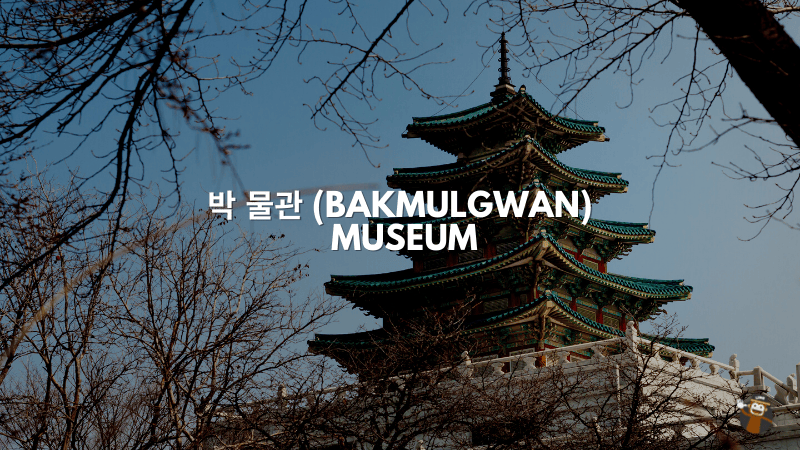
The Korean culture is very rich and colorful; that’s why “museum” is part of this list of Korean vocabulary about places. There are lots of museums in South Korea that feature their culture and traditions. Going to museums is one of the most exciting things to do when you visit South Korea, especially if you’re an artsy person.
Some of the famous museums in South Korea are Mimesis Art Museum, Museum SAN, SOMA Museum of Art, SeMA Seoul Museum of Art, National Science Museum, South Korea, Gallery White Block, Incheon Open Port Museum, and Korean Folk Village.
극장 (Geukjang)
English Translation: Movie Theater
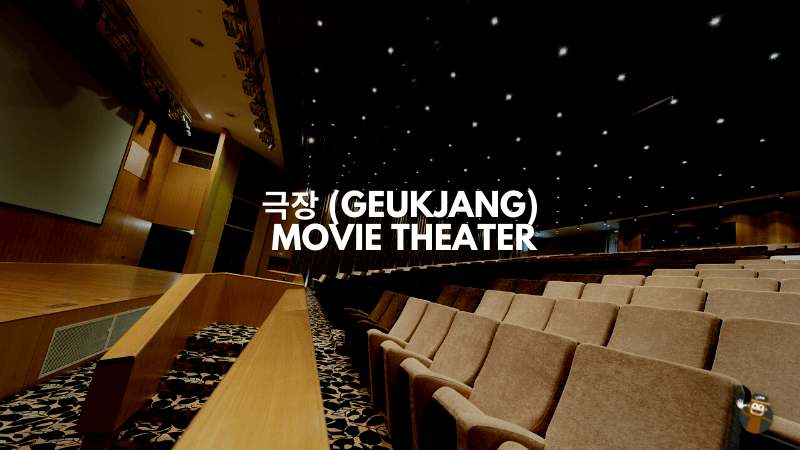
Having a movie night with your friends or loved ones? South Korea is known for its K-dramas and movies. So, where can you enjoy watching these Korean movies than in South Korea? Movie theaters (극장 Geukjang) are perfect for enjoying the latest movies. If you’re in South Korea and you want to watch a movie, there are lots of choices to choose from like Busan Cinema Centre, Megabox COEX Mall, Blue Square, and CGV Yongsan.
Other Basic Korean Words And Phrases Related To Places
| Hangul (Korean) | Romanization | English Translation |
| 미술관 | misulgwan | art museum |
| 놀이공원 | norigongwon | amusement park |
| 운동장 | undongjang | athletic field |
| 아파트 | apateu | apartment |
| 목욕탕 | mogyoktang | bathhouse |
| 빵집 | ppangjjip | bakery |
| 술집 | suljib | bar/pub |
| 서점 | seojeom | bookstore |
| 카페 | kape | cafe |
| 카페테리아 | kapeteria | cafeteria |
| 교실 | gyosil | classroom |
| pc방 | pcbang | cyber cafe |
| 컴퓨터 매장 | keompyuteo maejang | computer shop |
| 코인 세탁소 | koin setakso | coin laundry |
| 시청 | sicheong | city hall |
| 시내 | sinae | city |
| 공사장 | gongsajang | construction site |
| 시내 | sinae | downtown |
| 면세점 | myeonsejeom | duty-free shop |
| 할인점 | harinjeom | discount store |
| 놀이 공간 | nori gonggan | entertainment place |
| 응급실 | eunggeupsil | emergency room |
| 초등학교 | chodeunghakgyo | elementary school |
| 주유소 | juyuso | gas station |
| 소방서 | sobangseo | fire station |
| 생선 가게 | saengseon ga-gye | fish store |
| 집 | jip | home |
| 고등학교 | godeunghakgyo | high school |
| 도시에서 | dosieseo | in the city |
| 여관 | yeogwan | inn |
| 소년원 | sonyeonwon | juvenile reformatory |
| 노래방 | noraebang | karaoke (room) |
| 대여점 | daeyeojeom | lent shop |
| 도서관 | do seo gwan | library |
| 세탁소 | saetakso | laundry |
| 시장 | sijang | market |
| 마사지 샵 | masaji syap | massage parlor |
| 중학교 | junghakgyo | middle school |
| 고아원 | goawon | orphanage |
| 공개된 장소 | gonggaedoen jangso | open place |
| 운동장 | undongjang | playground |
| 교도소 | gyodoso | prison |
| 공원 | gongwon | park |
| 주차장 | juchajang | parking lot |
| 경찰서 | gyeong chal seo | police station |
| 우체국 | ucheguk | post office |
| 항구 | hanggu | port |
| 사진관 | sajingwan | photo studio |
| 유치원 | yuchiwon | preschool |
| 리조트 | rijoteu | resort |
| 양로원 | yangnowon | senior home |
| 노인정 | noinjeong | senior center |
| 경기장 | gyeonggijang | stadium |
| 스키장 | seukijang | ski resort |
| 수영장 | suyeongjang | swimming pool |
| 방송국 | bangsongguk | television station |
| 시계탑 | sigyetap | tower clock |
| 읍내 | eumnae | town |
| 대학교 | dae hak gyo | university |
| 비디오방 | bidiobang | video room |
| 동물원 | dongmurwon | zoo |
| 화장실은 어디에 있습니까? | hwajangsireun eodie issseupnikka? | Where is the bathroom? |
| 기차역이 어디예요? | Gichayeogi eodiyeyo? | Where is the train station? |
| 버스 정류장이 어디예요? | Beoseu jeongnyujangi eodiyeyo? | Where is the bus stop? |
| 경기장은 어디 있어요? | Gyeonggijangeun eodi isseoyo? | Where is the stadium? |
| 경복궁 가려면 어디에서 갈아타요? | Gyeongbokgung garyeomyeon eodieseo garatayo? | Where do I change for Gyeongbokgung Palace? |
Learning Korean Language With Ling App
It’s not a coincidence that you have just suddenly clicked this article. You’re maybe here because of the influence of Hallyu, so why not make it worth it and start learning Korean now? Imagine how amazing it will be to be able to talk in Korean. You don’t have to translate every word or use subtitles when watching K-dramas or listening to a song. You don’t need to be anxious and shy while talking to the locals. Most of all, you can fully channel and imbibe your inner Korean.
With the Ling app, you can learn a language like you’re just playing games. You’ll learn Korean words backed with English translations, romanizations, example sentences, audio recordings, and pictures. You can also master your language skills through dialogues and grammar explanations. Say goodbye to the traditional way of learning languages.
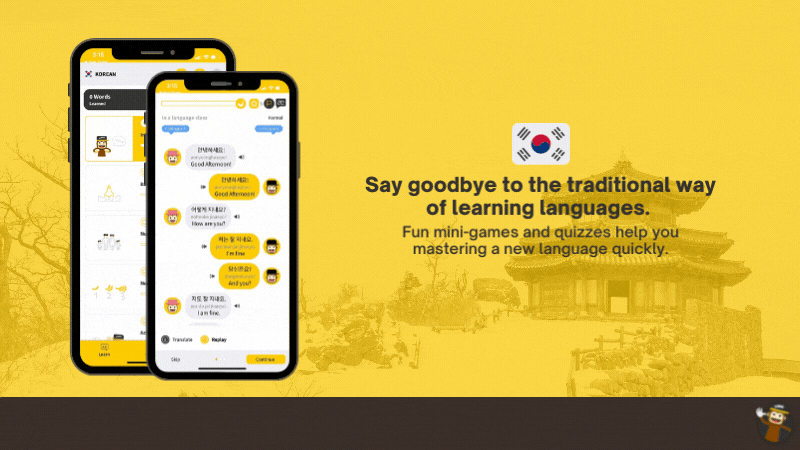
With Ling App, you can learn Korean anytime and anywhere you want. Just go to the website or download the app on your mobile phone. Waste no time and start your language learning journey with Ling App now!















